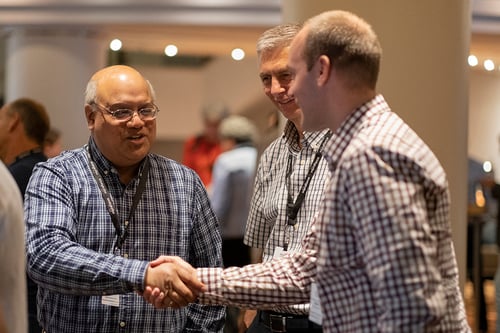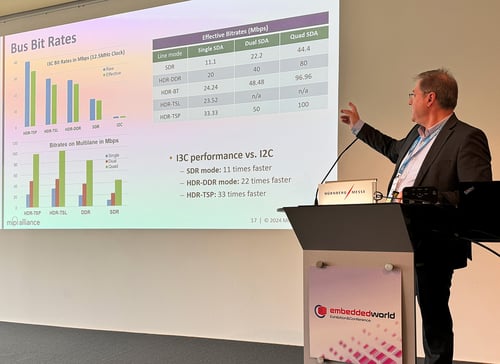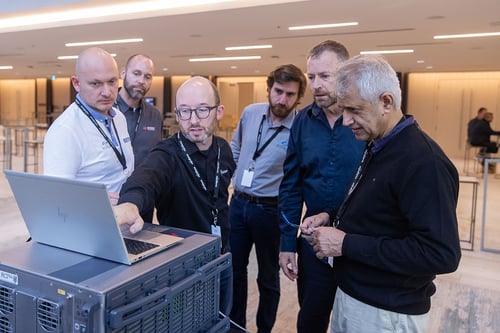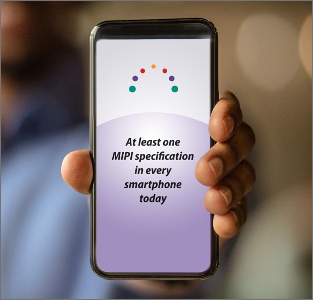5 min read
MIPI Audio Webinar Series: Exploring the Latest Developments with MIPI Audio Interfaces
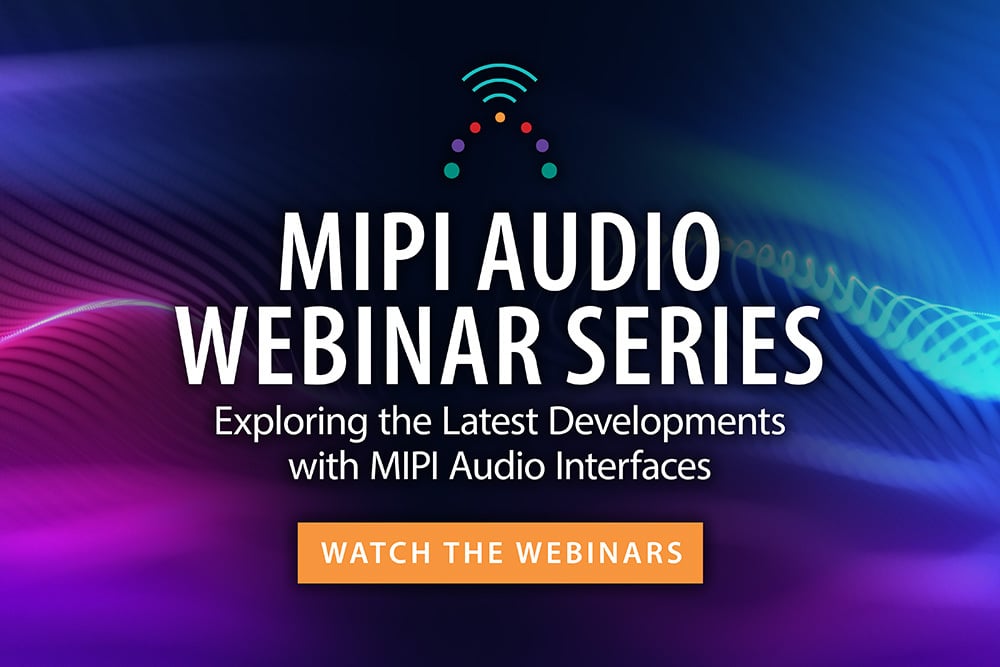
- Resources
- Webinars & Workshops
MIPI Audio Webinar Series
21-23 October 2025
Embedded audio solutions are increasingly leveraging MIPI interfaces and protocols to interconnect ever greater numbers of advanced audio components, subsystems and systems-on-chips (SoCs). Since the advent of MIPI SLIMbus® in 2008 (now a legacy specification), MIPI’s portfolio of audio specifications has greatly expanded with the release of MIPI SoundWire® in 2015, and the new MIPI SoundWire I3S (SWI3S™) specification, released in October 2025. Recent developments also include the delivery of two important audio software specifications – MIPI DisCo™ for SoundWire® and MIPI SoundWire Device Class for Audio (SDCA™). These advancements enable the current portfolio of MIPI audio specifications to address an ever-broadening set of embedded audio use cases within mobile devices, tablets, laptop PCs, IoT devices, automobiles and beyond.
In this three-part webinar series, the leaders of the MIPI Audio and Software working groups provide an introduction to the portfolio of current MIPI audio specifications and share insights into future specifications in development. The series starts with a primer session, offering a system-level overview and high-level introduction to MIPI audio interfaces and supporting software specifications. Building on this introductory session, the following two webinars take a more in-depth look at the latest audio advancements—MIPI’s new SWI3S audio interface, and the growing suite of audio software specifications and tools.
Sessions and Presenters
A Primer on MIPI Audio Specifications
21 October
Presenters: Niel Warren and Aruni Nelson
This introductory session sets the stage for the week's more in-depth webinars covering the upcoming MIPI SWI3S specification, and audio software specifications and tools. It begins with a system-level overview of MIPI’s portfolio of audio interfaces and supporting software specifications, explaining how this comprehensive suite of specifications provides a flexible framework for the development of embedded audio systems.
After the overview, the session examines each MIPI audio interface in more detail, covering the current MIPI SoundWire, new MIPI SWI3S and (briefly) legacy MIPI SLIMbus interfaces, diving into the history, purpose, characteristics and properties of each interface. A brief overview of MIPI’s supporting audio software specifications, conformance test suite and other tools is also be included.
Presenters
-
Niel Warren
 Niel Warren, Technical Consultant, MIPI Audio Working Group, and former chair of the Audio Working Group
Niel Warren, Technical Consultant, MIPI Audio Working Group, and former chair of the Audio Working GroupOver the past 40 years, Niel has been at the forefront of audio and connectivity innovation, contributing to key technologies including USB Audio 2.0 and 4.0, Thunderbolt networking, DisplayPort 1.0, AVB (IEEE Ethernet Audio), and MIDI. He developed and shipped the first music synthesizer with synchronized LFO (Low Frequency Oscillator) to MIDI clocks and MIDI sample dump. His work has supported more than 100 commercially released audio products—from Mac computers and music synthesizers to smartphones and earbuds—with annual volumes ranging from thousands to hundreds of millions of devices.
-
Aruni Nelson
 Aruni Nelson, Chair of the MIPI Audio Working Group
Aruni Nelson, Chair of the MIPI Audio Working Group
Principal Engineer, Intel CorporationAruni is a principal engineer at Intel Corporation, focused on high-speed and low-speed IO technology development and debug software architecture. She has contributed to several industry standard specifications for next generation IO and debug technologies in multiple open standards forums. At MIPI, she chairs the Audio Working Group and IO Bridges Working Group, and leads the development of future debug specifications (e.g., Debug Over PCIe and Debug Over UCIe). Aruni also serves as the co-vice chair of the I3C Working Group. A gold medalist from Bangalore University in India, she holds a Bachelor of Engineering degree and brings broad expertise in developing technology products, from client PC and mobile devices, to medical imaging systems, and broadcasting switching and routing equipments.
Introducing MIPI SoundWire I3S (SWI3S)
22 October
Presenters: Niel Warren, Aruni Nelson and Christian Jenkner
The MIPI SWI3S specification addresses the market’s need for a new low latency, multi-drop, higher transport bandwidth (up to 76 Mbps) audio interface. The specification provides multiple physical-layer (PHY) options with unified protocol and software, including reduced EMI/EMC 2-wire low voltage signaling with embedded clock, suitable for use in ever-smaller, more tightly packaged devices (e.g., smart earbuds, smartwatches), and larger devices that require multi-meter audio line lengths (e.g., cars, robots, large display panels).
This session offers a comprehensive guide to the SWI3S interface, covering key use cases, characteristics and properties, as well as new PHY options, protocols and command flows (with examples). It also provides an overview of key features and enhancements (over previous generation MIPI / non-MIPI audio interfaces), a summary of supporting specifications and tools (including the SWI3S visualizer tool), and a preview of what’s coming next in SWI3S v1.1.
Presenters
-
Niel Warren
 Niel Warren, Technical Consultant, MIPI Audio Working Group, and former chair of the Audio Working Group
Niel Warren, Technical Consultant, MIPI Audio Working Group, and former chair of the Audio Working GroupOver the past 40 years, Niel has been at the forefront of audio and connectivity innovation, contributing to key technologies including USB Audio 2.0 and 4.0, Thunderbolt networking, DisplayPort 1.0, AVB (IEEE Ethernet Audio), and MIDI. He developed and shipped the first music synthesizer with synchronized LFO (Low Frequency Oscillator) to MIDI clocks and MIDI sample dump. His work has supported more than 100 commercially released audio products—from Mac computers and music synthesizers to smartphones and earbuds—with annual volumes ranging from thousands to hundreds of millions of devices.
-
Aruni Nelson
 Aruni Nelson, Chair of the MIPI Audio Working Group
Aruni Nelson, Chair of the MIPI Audio Working Group
Principal Engineer, Intel CorporationAruni is a principal engineer at Intel Corporation, focused on high-speed and low-speed IO technology development and debug software architecture. She has contributed to several industry standard specifications for next generation IO and debug technologies in multiple open standards forums. At MIPI, she chairs the Audio Working Group and IO Bridges Working Group, and leads the development of future debug specifications (e.g., Debug Over PCIe and Debug Over UCIe). Aruni also serves as the co-vice chair of the I3C Working Group. A gold medalist from Bangalore University in India, she holds a Bachelor of Engineering degree and brings broad expertise in developing technology products, from client PC and mobile devices, to medical imaging systems, and broadcasting switching and routing equipments.
-
Christian Jenkner
 Christian Jenkner, Co-Vice Chair of the MIPI Audio Working Group
Christian Jenkner, Co-Vice Chair of the MIPI Audio Working Group
Director, Infineon TechnologiesChristian is an electrical engineer with over 30 years of experience, specializing in audio sensor technologies. At Infineon Technologies Austria, he focuses on concept development, digital design and project management within the Audio Sensors team. His work supports innovation in microphones and digital audio systems, combining deep technical knowledge with a practical, system-level approach. Christian has contributed across the full product lifecycle, from early concept to industrialization, helping advance high-performance, low-power audio solutions for consumer and industrial applications.
MIPI Audio Supporting Software Specifications and Tools
23 October
Presenters: Devon Worrell and Jon Eklund
MIPI’s publicly available audio software specifications define standardized mechanisms for host devices to interact with host-controllable audio devices connected via a MIPI SoundWire interface, simplifying audio software architectures and driver requirements for SoundWire-connected devices.
This session explores MIPI’s target audio software framework, covering MIPI SDCA and the MIPI DisCo Specification for SoundWire, and previews the upcoming MIPI Audio Portal Specification. It also dives into how these software specifications can be leveraged by developers to optimize the integration of microphones, amplifiers and other audio devices into host platforms.
Presenters
-
Devon Worrell
 Devon Worrell, Chair of the MIPI Software Working Group
Devon Worrell, Chair of the MIPI Software Working Group
Audio Architect, Realtek Semiconductor Corp.Devon Worrell, audio architect at Realtek Semiconductor Corp., serves as chair of the MIPI Software Working Group.
-
Jon Eklund
 Jon Eklund, Co-Vice Chair of the MIPI Software and Audio Working Groups
Jon Eklund, Co-Vice Chair of the MIPI Software and Audio Working Groups
Software Architect, Cirrus LogicJon is a principal software architect at Cirrus Logic, where he leads the design of standards-based audio solutions for PC applications. Before joining Cirrus, he worked on embedded and mobile multimedia system software at Motorola Mobility with a particular focus on flexible, extensible audio system frameworks. Jon brings over 20 years of audio driver and hardware-software system experience to his co-vice chair roles in the MIPI Software Working Group and Audio Working Group. He received his Bachelor of Science in computer engineering from Milwaukee School of Engineering.



